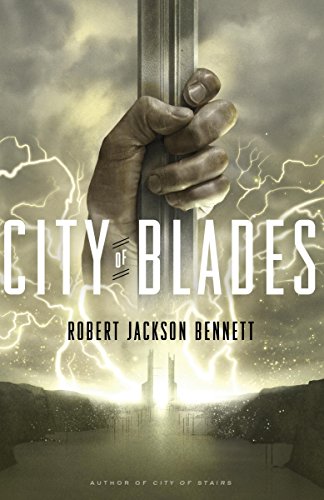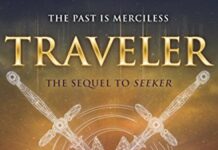
Ebook Info
- Published: 2016
- Number of pages: 490 pages
- Format: Epub
- File Size: 1.56 MB
- Authors: Robert Jackson Bennett
Description
A generation ago, the city of Voortyashtan was the stronghold of the god of war and death, the birthplace of fearsome supernatural sentinels who killed and subjugated millions.
Now, the city’s god is dead. The city itself lies in ruins. And to its new military occupiers, the once-powerful capital is a wasteland of sectarian violence and bloody uprisings.
So it makes perfect sense that General Turyin Mulaghesh— foul-mouthed hero of the battle of Bulikov, rumored war criminal, ally of an embattled Prime Minister—has been exiled there to count down the days until she can draw her pension and be forgotten.
At least, it makes the perfect cover story.
The truth is that the general has been pressed into service one last time, dispatched to investigate a discovery with the potential to change the world–or destroy it.
The trouble is that this old soldier isn’t sure she’s still got what it takes to be the hero.
User’s Reviews
From School Library Journal The Battle of Bulikov is five years over (City of Stairs), and Gen. Turyin Mulaghesh has retired on the island nation of Javrat. A messenger arrives from Shara Kamayd, former junior diplomat, actual spy, and now prime minister of Saypur. Turyin and Shara fought the Battle of Bulikov together, and it changed them and their world. Since then, Shara has been responsible for a complete transformation of Saypuri dominance over the Continent. Now she needs Turyin’s experience with renegade gods and miraculous artifacts, because something is not quite right in the remote country of Voortyashtan. A new metal has been discovered with incredible properties, and the continued existence of miraculous materials means that perhaps the vanquished God of Voortyashtan is still alive. Turyin knows exactly how dangerous that is, and soon finds herself in the inhospitable land of Voortyashtan, reliving some of her worst battle experiences and trying to cope with gods, miracles, the perfidy of the greedy, and the heroism of loyal citizens. This complex tale of conquest and war, politics and magic, and battle fatigue and heroism will draw new and old readers. The regret Turyin and others have about their past deeds, while striving to do better will resonate with readers who enjoy fantasy lands as nuanced and complex as the real world. VERDICT A great option for lovers of intrigue, politics, and ancient meddlesome gods walking through the world.—Gretchen Crowley, Alexandria City Public Libraries, VA –This text refers to an alternate kindle_edition edition.
Reviews from Amazon users, collected at the time the book is getting published on UniedVRG. It can be related to shiping or paper quality instead of the book content:
⭐ Remember General Mulaghesh, the tough soldier from City of Stairs? Turns out her retirement isn’t going so well, she is tortured by PTSD and a guilty conscience of maybe having committed war crimes in her youth. She is missing a purpose. And of course, she’s missing a hand.So when a new assignment comes along she begrudgingly accepts it and goes to the port city of Voortyashtan, which at the time of the gods, was ruled by the goddess of war and her terrifying army of Sentinels, people who gave up their whole self to become magical and almost unbeatable soldiers for the promise of an afterlife, where they would wait to come back to the land of the living for a last war that would destroy all humankind.If you read City of Stairs (and you probably should, before reading this), you get an idea of how this is going to go: the protagonist will follow a trail that touches both earthly politics and divine machinations to a final showdown.Maybe the novelty of this fictional world wore down a bit from the 1st book. Maybe there was too much divine and too little real life stuff (I am not a big fan of fantasy, and I positively hate it when magic is used as deus ex machina, that’s just lazy writing). Maybe the divine elements weren’t as fascinating as those in City of Stairs (a city that exists in 2 different dimensions? Stairs to nowhere? Now that’s cool stuff!).In solid Bennet tradition, character development is excellent, the characters are believable and relatable. As a sufferer of PTSD myself, I found Mulaghesh’s struggles realistic and I was able to empathize with her.So I didn’t hate this book, believe me there’s way worse junk out there, god only knows how much garbage I have slogged through because I believed the glowing reviews. I guess Bennet set the bar too high with City of Stairs. I will very probably buy the next in the series, I am just not in a terrible hurry to do so. I remain a fan of Bennet’s, I am really happy I discovered this author, and will continue reading his work in the future.
⭐ I was actually a lot more into this book, which is the second in the series, than I was in the first. I think what did it for me were the characters. I sort of felt like last time, the characters were lists of attributes, but I think they made the leap this time into more complex people. I would still recommend reading the first book, because there is a lot of worldbuilding going on that forms a useful (and essential) background to what happens in this volume.Please note: There may be some minor spoilers for book one (City of Stairs) in this review. I’ll try to keep them to a minimum.There is a lot of character overlap with book one, but the protagonist is different. This time, our main POV character is General Turyin Mulaghesh (this is a woman, if you’re not familiar with book one). She spent much of book one pining for retirement on a faraway island, but when we meet her at the beginning of this book, we see retirement was not really agreeing with her. (We learn that this is a theme in her life.) There is also an issue with her length of service as it relates to her pension. So Shara (the heroine of book one, who is now Prime Minister) gets Mulaghesh to come back for a few more months. (This is a common practice, apparently.)Shara sends Mulaghesh to Voortyashtan, which was formerly the city associated with Voortya, the goddess of death. A lot is going on. A new substance has been discovered and there is a mining operation to recover more of it. A government employee who was investigating this new substance has gone missing. The harbor is being worked on by a Dreyling (think Nordic types if you want to compare to our world) company under the direction of Signe, one of the daughters of Sigurd (Shara’s assistant from book one) and something secretive is going on there.I just like Mulaghesh better than Shara as a POV character, for some reason. She doesn’t know everything, she isn’t a young idealist, etc. (She does exhibit some idealism, and that becomes important later in the book.) Other characters have appropriate depth for the amount of page time they get. Sigurd we already know, but he is in a new role here and he is not entirely comfortable with it. Signe actually gets quite a lot of depth. Anyway, I really liked the characters here.Once again, the book starts out as a mystery, or at least partly so. It evolves into several mysteries — who committed a series of grisly murders, who stole a bunch of explosives, is there anything Divine or otherwise suspicious about the substance being mined, who left evidence of performing what must have been a miracle in the mine (in this instance, “miracle” refers to a ritual associated with one of the Divinities designed to have a specific effect)? You do get the answers to these questions and more by the end of the book, and I think the answers are set up nicely and with sound bases in the earlier parts of the story (no deus ex machina, in other words).There are those who will argue that the plot is very similar to book one. They’re not exactly wrong, but I found that it was a little bit different, and there is enough *else* going on that you don’t always have time to think about that.Some of the themes are the same from book one. With the Divinities gone, Saypuri technology is expanding and taking over, even on the Continent, and magic or the Divine is receding. People have to deal with that, including cleverly using technology to overcome unexpected Divine problems. There is also a fair amount of racism. Natives are called “Shtanis” and there actually pretty much none of them in the story, only Saypuris and Dreylings. The characters we do follow view the “Shtanis” with suspicion or outright hostility and suspect them of all manner of horrible things. In a sense, it’s payback — the Continentals enslaved Saypuri folks not too many generations ago, and prejudice runs deep. (In the first book, our token Continental character was a member of the elite upper classes.)There is quite a lot of action, including a battle that seems fitting for the end of most books coming about 2/3 through this one. I thought the pacing was great, building naturally from a slower investigation (complete with roadblocks) to a frantic race to stop an apocalypse.Tone-wise, this is fairly bleak and dark. I am OK with that but I understand that it will not be for everyone. It seems a natural progression for the story the author wants to tell, though, and I think it is probably politically realistic.In the end, I thought characterization was much improved from book one. I like the small details that relate to the transition from a society of magic (essentially) to one of technology. I liked the relationship between Sigurd and his daughter. I liked the interrelatedness of all the mysteries and plotlines. I kept wanting to pick this up and read when I should have been doing other things. So, despite the similarities in plots of book 1 and book 2, overall I enjoyed this quite a lot.
⭐ I enjoyed City of Stairs, and am more than happy to say that I found this book a more enjoyable read. The plot takes place 5 years after the events in the first book took place, in Voortyashtan, a much different setting than Bulikov, where the first book took place, without detracting from the Divinity, and while the new setting is basically a backwater, the world-building is still just as amazing as the first series. This time, though, the narration focuses on Mulagesh, who I found to be a more interesting character; more about her past is revealed and a lot of her struggles associated with PTSD are given attention, showing a more vulnerable and humanizing side to her without detracting from her tough-as-nails character. New characters are also introduced -for example, including a major supporting one from Mulagesh’s dark past, along with Sigrud’s estranged daughter, Signe, who was an enjoyable addition to the series and another strong female character and brilliant engineer -with a few from the first book playing a somewhat minor role (but will play more important parts in the last book in the trilogy). Wish I could write better reviews, but City of Blades -well, the entire trilogy -is really worth reading even if you’re not really into fiction like me, or are looking for a good fantasy series that isn’t typically Tolkien-esque -and each book gets better, so definitely pick up the final book next.
⭐ Read this.I read City of Stairs, and I enjoyed it enough to be happy when I saw a sequel. But not enough to make the effort of writing a review. (I don’t review books I don’t like. Seems like a waste of energy.) But this book is beyond City of Stairs.My favorite kind of book is an adventure that is action-packed, interesting and unpredictable. Usually, this means I need more world-building than your basic norse or gael based mythology on a recognizable world. Add a teen age male hero and there had better be something that makes the book interesting, or I want my money back.Bennett began his exploration of faith in humanity vs. faith in a greater being in City Stairs, and it was interesting. He took the metaphor of lost faith and make it literal. His heroes were based in a more eastern tradition. The world that he created made it easy to sympathize with the dying faithful and the rising godless, scientific class.of the Saypuris. You sympathized with the faithful martyrdom of the people whose gods were literally killed. You sympathized with the desire of the Saypuris to find those last shreds of magic, while at the same time rooting for them to eradicate the last vestiges of zealotry from the continent.But City of Blades takes that exploration of faith and empathy to a whole new level. It is timely. Told from the perspective of an old soldier, the comparison between the experiences of the Saypuri soldiers in a hostile country, unable to tell enemy from civilian, is painfully similar to the experiences of real world men and women who set out to serve, and find themselves in situations where ethics, morality and survival blur. City of Blades explores these ideas without judging.Also, for those who pay attention to these things – the main character is a woman, whose sexuality is not at issue. THANK YOU BENNETT! Her strength is not derived from gender-typical fantasy book victimhood. She is not raped or abused or otherwise forced out of conventional femininity by male aggression or abuse. There is no subplot of romance in order to achieve a required female happy ending with the appropriate hero. She is simply a soldier, trying to do what is right. And she is freaking awesome.I don’t mean to imply that this book is not a fun read. It is. it’s riveting and entertaining and even funny in places. The good guys are genuinely good. The bad guys are worth defeating. But it’s also a whole lot more. It continues the exploration of what it means to have faith in something, whether it’s in some kind of superior being, or humanity, or some combination thereof. More of this, please!
⭐ I almost took off a star here not because the book deserved it … But because it totally made me cry at the end. The author writes incredibly well and his books are fantastic but my goodness he is totally OK with killing off characters and the figurative psychological pain it will presumably inflict on his still alive characters. In the end, being fair though, I can’t deduct a star from a book I lost sleep over staying up to read just because I personally am a sensitive little special flower. Just FYI his endings are not fluffy puppies and kittens and unicorn sparkles under skies of rainbows and fields of flowers with children’s laughter and butterflies and pancakes.
⭐ City of Blades is a fantastic follow up to the City of Stairs set five years after the events of City of Stairs and my things have changed. This book doesn’t feature Shara, heroine of the previous book and I thought I’d miss her, but Mulaghesh was a fantastic character to follow and see this world through. She filled the void of Shara not being the main character beautifully and with the addition of Sigrud’s daughter Signe and Sigrud himself this was again an intelligent, insightful, intriguing, with some action and mystery to be solved that might even be better than City of Stairs.The Premise:Mulaghesh has retired and is pretty much just wasting her life in a sleepy little town when Shara pulls her back into service to go to a place Mulaghesh hates, with a man in it that Mulaghesh has a bloody history with to find out what happened to an agent who has gone missing.Mulaghesh it seems has quite a past and it is teased out little by little. It really makes her the perfect person to be on this mission and in this place. She knows how sometimes the good intensions you start out with go to hell in a war and how quickly it can all go off the rails.***What wild promises we make in order to justify the worst of decisions. ***Voortyashtan is a place trying to rebuild itself. It again use to be the master and is now at the mercy of the former slaves. Voortya was the first god to fall and she was the god of death who promised her followers an afterlife where they would gather until the final war where they would be reborn to fight in it until the end of the world.What I really like about the writing of Robert Jackson Bennett is how smart it is. There is this huge world full of fantasy and wonder and there is a mystery. Everything is done well; the history of the people, the politics, the magic, characters and everything else that goes into this story. I’m really in awe of the big twists that I didn’t see coming but made perfect sense when they happened.Mulaghesh is a wonderful main character. I few of the things I love about her:1. She is a 50 something war veteran with one hand (not your typical heroine)2. She has a BLOODY past***“You’ve always believed war to be a grand performance. But to me it’s just killing, just the ugliest thing a person can ever do…So when you need to do it, there’s no need to make a show of it.”***3. She is smart, but not cocky and definitely has some issues because of her past.4. She has a clear sense of right and wrong and the greater good and knows her part in all of it.5. She makes no excuses; not for her past, her present or plans of the future6. She is friends with Sigrud (that is kinda a big deal)Sigrud on the other hand is just as fantastic. He is more complex than the killer on the surface would suggest. He has very deep thoughts and now has be reunited with his family after years apart. It isn’t all rainbows and sunshine because he has a strong willed daughter who grew up without him and is angry that he could have come back years before but instead worked with Shara.***And, later, when I was in prison…when I thought I would go mad…I held on to this very tightly, this memory of the little blond girl laughing as she ran through the forest. This tiny, perfect creature, darting among these great big trees. When the world grinds you down, you pick a handful of fires to hold close to your heart. ***It is hard to realize that the memories that were so important to you are not as important to those around you. Signe doesn’t remember that father and she will not let him forget it. But it seems the apple doesn’t fall far from the tree and Signe is just as smart and cunning as daddy dearest. I loved the dynamic this brought to the story.The only bad thing is that with so much going on there were some times that the story lulled a little. But then there would be a huge fight scene or big reveal that made that lull totally worth it.This is a little bleaker than some books in there are a few deaths that really hurt in it. The ending was also a little hard on me as some of the characters have to face new challenges and we know that they are not all in good positions. Sigrud for instance I feel for the most, especially after all the pain he has already endured. But I totally look forward to the conclusion to this series and hope that my summer heart can take it.
⭐ General Turyin Mulaghesh was done with working for the government. Or at least that’s what she though. But suddenly she has been informed that she has more work to do before she can receive her full pension. Or at least that is the cover story she gives to those she meets. In truth, General Turyin has been sent by Prime Minister Shara to Voortyashtan to determine if a discovery is divine in nature or not.This built on the promise of this first book and delivered an even better reading experience! For me, General Turyin was a much more enjoyable protagonist than Shara was in the first book. I felt the General’s was a much more complicated character whose internal demons made her a well developed personality. This depth of character coupled with the extraordinary pacing of the story make it a page turner that the reader will not be able to put down. I am really looking forward to the third installment in this series.
⭐ After finishing the first book I was not hooked. It was exciting, sure, but I did not feel that motivated to continue. In fact it took me a looong time to do so, and then I only started because I did not have anything more exciting to do. Somewhere in the middle of the second box I got more intrigued, and when I reached the last book I was far past the point of no return. I must say, I absolutely loved this book, and several weeks after having complited it I still think about it. It was such a great book, and Mulaghesh is such a compelling character. If you were like me, unsure weather to continue the series, I have only one advice: Do it! In my opinion the second book is better than the first, and the third is stronger yet!
⭐ There are some fantasy readers who just want swords and sorcery. And there are others who’ve read so much of that, and dwarves and elves and dragons and knights, that we appreciate attempts to do something new, to push the genre in different ways. Robert Jackson Bennett’s Divine Cities is good at this: deicide in an age of motorized vehicles, spies and military generals versus supernatural enemies, unmagical main characters, Kafka-esque bureaucracy and dry, modern humor all set his books apart from the run of the mill.In City of Blades, the second of the series, he also tries to get us away from the hero’s journey trope we find so often in fantasy, telling what’s essential a political mystery story (think Hunt for Red October) in a fantasy setting—or post-fantasy, you might call this, as the gods are dead. Only they’re not, really, which would be a cool reveal—except we saw it in the last book, and the mystery in this book depends on kind of forgetting that.Before we get into it, a few kudos: Bennett is a talented writer, and the prose and pacing draw you through the story regardless of whether the mystery really mystifies. He also has a knack for vibrant, unique characters, and for me they were the best part of the book.They didn’t manage to overcome its main flaw, though, which is that the driving interest of the story is a whodunit (on a grand political and divine scale), but we’re fed too much information to ever be surprised by the revelations the characters make. Instead of Wash’s ‘sudden but inevitable betrayal’ (search youtube: Firefly Clip: This Land), the reveals just feel inevitable, which doesn’t make for good mystery reading. Without the curiosity, the struggle to stay just one step ahead of the detective (in this case an unhappily-retired military general), the story loses its drive, and I ended up frustrated sometimes that the characters weren’t seeing what Bennett made so obvious.Enjoying this review? Find more like it at topnewfantasy dot com! On the other end of Wash’s spectrum, there are some sudden but far from inevitable moments that felt, well, deus ex machina—unexplained visions, gods rising from the seas, etc.—that could have been great with a little foreshadowing, but instead feel highly coincidental in terms of the main character gaining needed clues to solve the mystery.All this to say City of Blades is not for everyone. For long-time fantasy readers looking to break out of the tropes, or lovers of City of Stairs wanting to return to the world with not that many changes, the book will work well. It’s also some great prose—but if you’re looking to be pulled into a surprising plot, an intriguing mystery, or an action-packed page turner, you may want to stick to your guns—er, swords.
⭐ I received a copy of this book from NetGalley in exchange for an honest review.This is the second book set in this universe by Robert Jackson Bennett, but I believe they could stand alone. However, I STRONGLY urge you to read the first one because much like this one, I could not put it down for a second. I got lost for an hour when I made the terrible mistake of reading this on my commute- completely bypassed my stop by at least three or four stations.These books exist in a beautifully crafted world. Bennett has such a gift for immersing you in a complicated totally alien world and the pacing of his books is fantastic. I was thrilled to see some characters return from City of Stairs, but I grew equally attached to the new ones. Though in many ways I felt this was more violent than the first book, it felt like a turning point for Saypur and the Continent. The way he weaves in mystery with fantasy, episonage and warfare is like no other author I have read. Even if you do not think you enjoy books where half the races and names are different from our reality, you will enjoy this book.His characters are beautifully crafted, with strengths and weaknesses that feel real. The mythology he creates in this world is endlessly fascinating, and he gives you just enough information to leave you wanting more. In this book, our understanding of the nature of the Divine takes another step forward but leaves so many questions unanswered. Despite the serious, suspenseful and sometimes violent adventures we go through in this book, his moments of levity are genuinely laugh out loud funny if only for their wry unexpectedness.Also, this was present in City of Stairs, but I LOVE the way he has crafted “historical” documents, folklore and government reports that he quotes from at the start of each chapter. The depth of this world is phenomenal, and with each book I want more.I wouldn’t recommend this for readers below the high school level due to language and violence, but I can’t imagine not recommending this book to anyone else.
Keywords
Free Download City of Blades: A Novel (The Divine Cities Book 2) in Epub format
City of Blades: A Novel (The Divine Cities Book 2) Epub Free Download
Download City of Blades: A Novel (The Divine Cities Book 2) 2016 Epub Free
City of Blades: A Novel (The Divine Cities Book 2) 2016 Epub Free Download
Download City of Blades: A Novel (The Divine Cities Book 2) Epub
Free Download Ebook City of Blades: A Novel (The Divine Cities Book 2)





